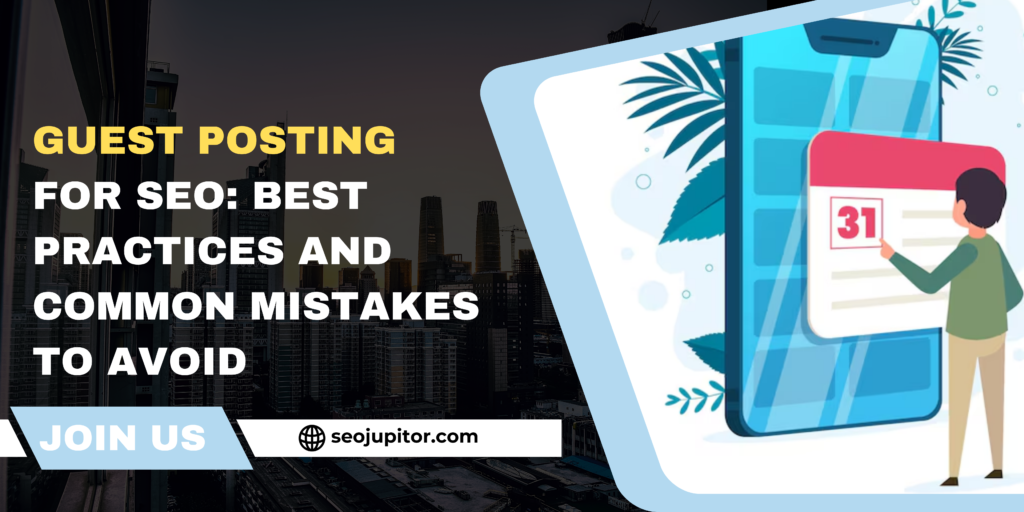Guest posting, or guest blogging, is one of the most effective strategies for improving SEO, building backlinks, and growing your online presence. When executed correctly, guest posting can boost your website’s authority, increase traffic, and enhance brand visibility. However, there are best practices to follow and common mistakes to avoid if you want to achieve the maximum benefit from your guest posting efforts.
In this blog post, we will discuss the best practices for guest posting as part of your SEO strategy, and highlight the mistakes you need to steer clear of to make the most of your efforts.
Best Practices for Guest Posting for SEO
- Target High-Quality Websites Not all websites are created equal. To gain real SEO benefits from your guest posts, you need to target high-quality sites with good domain authority. Look for websites within your industry or niche that already have an established audience, strong backlink profiles, and are trusted by search engines. Websites with high authority in your niche can provide you with high-quality backlinks, which are valuable for improving your search engine rankings.
- Focus on Relevance When selecting sites for guest posting, always prioritize relevance. Your guest post should align with the topic and audience of the website you are writing for. Relevance isn’t just about keyword optimization; it’s about ensuring that the content resonates with the target audience. Irrelevant content will not only fail to engage readers, but it can also harm your SEO efforts. Relevant guest posts drive targeted traffic, increasing the chances of engagement and conversions.
- Write High-Quality Content Content is king, and this holds true for guest posting as well. Ensure that your guest posts are well-written, valuable, and informative. Quality content provides real value to readers, which in turn enhances your brand’s reputation and encourages readers to visit your website. Focus on crafting content that answers questions, solves problems, or offers insights. Avoid producing filler content just for the sake of publishing; prioritize depth, usefulness, and originality to stand out.
- Incorporate Relevant, Natural Links A key benefit of guest posting is acquiring backlinks to your website, which improves your domain authority and rankings. However, it’s essential to integrate links naturally and helpfully. Links should add value to the content and guide readers to resources that enhance their understanding. Avoid keyword stuffing or unnaturally placing links. Guest posts that flow naturally and provide quality references will resonate better with both readers and search engines.
- Use a Compelling Author Bio Your author bio is a great opportunity to establish your authority and promote your website. It’s where you can introduce yourself and your business in a concise, engaging way. Include a link to your website or a relevant landing page, but don’t overdo it with self-promotion. Make sure the bio aligns with the tone of the post, and ensure that it provides readers with enough context about your expertise to increase their interest in checking out your website.
- Build Relationships with Site Owners Guest posting isn’t just about getting backlinks—it’s about building relationships with other industry professionals. By fostering genuine relationships with blog owners, editors, and influencers, you can expand your network, gain access to future opportunities, and increase your credibility in the industry. Building rapport can help you secure more guest post spots and collaborate on additional projects, further expanding your reach and SEO footprint.
- Track and Measure Your Results As with any SEO strategy, it’s important to track and measure the effectiveness of your guest posts. Monitor metrics like referral traffic, the quality of backlinks, keyword rankings, and engagement levels. By tracking these key performance indicators (KPIs), you can determine which guest posting efforts are paying off and adjust your strategy accordingly to maximize results.
Learn here – How to Increase the Value of Your Website with Guest Blogging
Common Mistakes to Avoid in Guest Posting for SEO
- Choosing Low-Quality Websites Not all backlinks are created equal. While guest posting on any blog might seem like a good way to build links, choosing low-authority or irrelevant websites can harm your SEO. Low-quality websites may have spammy content or poor SEO practices, and links from these sites could negatively impact your rankings. Always prioritize quality over quantity and ensure that the sites you target have strong domain authority and a reputation for providing value to their readers.
- Over-Optimizing Anchor Text When incorporating backlinks into your guest posts, it’s important not to over-optimize your anchor text. Using the same exact keyword-rich anchor text in every guest post can lead to unnatural linking patterns, which search engines may view as manipulative. Instead, vary your anchor text naturally and use it contextually to guide the reader toward relevant information. A more organic approach will ensure that your guest posts provide a better user experience and help protect your site from search engine penalties.
- Neglecting Content Quality for Backlinks It’s tempting to focus on securing as many backlinks as possible, but sacrificing content quality in the process can harm your brand reputation and SEO efforts. Don’t write low-effort guest posts simply to get a link. Instead, invest time in crafting valuable content that will benefit readers and establish you as an authority in your field. Content that provides value is more likely to get shared, linked to, and commented on, all of which contribute to improved SEO performance.
- Failing to Follow Site Guidelines Many websites and blogs have specific guidelines for submitting guest posts. Failing to follow these guidelines is one of the quickest ways to have your submission rejected. Each site has its own expectations for content quality, formatting, and backlink policies. Read the guidelines thoroughly before submitting your post and ensure that your content meets the site’s standards. Adhering to these requirements will increase your chances of getting published and improve the likelihood of success.
- Overlooking the Importance of Outreach Guest posting relies heavily on outreach, and a lack of a structured outreach process can hinder your efforts. Sending generic, unsolicited emails to blog owners may come across as unprofessional and may not result in guest posting opportunities. Instead, focus on crafting personalized outreach emails that explain why your content is a good fit for their audience. Be respectful, clear, and concise when making your pitch.
- Ignoring the Long-Term Commitment SEO results from guest posting are not instantaneous. Building a robust guest posting strategy takes time, and you may not see immediate changes in your rankings or traffic. Keep in mind that SEO is a long-term game, and consistency is key. Don’t expect overnight success; focus on building a consistent and high-quality guest post portfolio over time for lasting results.
Conclusion
Guest posting for SEO can be a highly effective strategy for increasing traffic, building backlinks, and establishing your brand’s authority. By following best practices like targeting high-quality websites, creating valuable content, and building relationships with site owners, you can maximize the SEO benefits of a guest blogging site. On the other hand, avoiding common mistakes—such as choosing low-quality sites, over-optimizing anchor text, and neglecting content quality—will help ensure your guest posting efforts are successful and contribute positively to your long-term SEO strategy. Keep these best practices and pitfalls in mind to unlock the full potential of guest posting for your SEO success.





Your blog post was really enjoyable to read, and I appreciate the effort you put into creating such great content. Keep up the great work!
I can’t get enough of your insightful articles and engaging stories. Thank you for sharing your passion with the world!